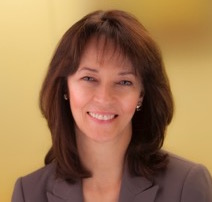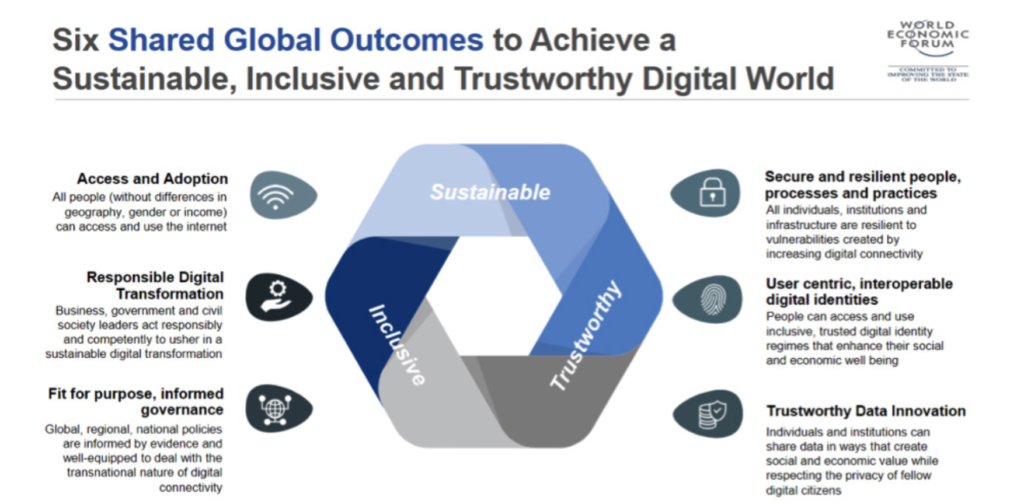
LYNN ST.AMOUR
Chair of the UN Internet Governance Forum Multistakeholder Advisory Group (IGF-MAG)
A contribution of the World Economic Forum’s System Initiative on Digital Economy and Society, introduced by Lynn St Amour, Chair, UN Internet Governance Forum Multistakeholder Group and Co-Chair of the World Economic Forum’s System Initiative on Digital Economy and Society.
AN INTRODUCTION
In December 2018, we reached a milestone: 50% of the world’s population are now connected to the internet, fifty years after it was created and thirty years after the invention of the World Wide Web. Growth in internet access for users is slowing, while the number of devices connected through the internet of things is expected to explode to 50 billion in the next few years. There is growing realization that digital divides are increasingly economic and social divides. Amongst those already connected, a crisis of trust is brewing. By 2022, it is expected that 60% of global GDP will be digitized – yet recent data shows that only 45% of people believe that technology will make their lives better.
Digital technologies provide us with the potential to greatly enhance economic, social and environmental outcomes for humanity. However, if the risks outweigh the bene ts or if we cannot overcome common barriers, the power of technology will at best be wasted, and at worst could further exacerbate exclusion, concentration of power and wealth and the stability of our societies. Tackling these common barriers requires common goals and coordinated multistakeholder action – to create a digital future that is inclusive, trustworthy and sustainable.
AN INCLUSIVE, TRUSTWORTHY AND SUSTAINABLE DIGITAL FUTURE 1
The global nature of the digital environment brings with it a rich cultural and normative diversity, with different types of stakeholders having different, often competing, interests. Nevertheless, through our dialogues, all parties agreed on three core and interdependent concepts about what we want our future digital environment to look like.
First, our digital future must be inclusive. Inclusion does not just refer to internet access and accessibility, but also includes participating in the social and economic bene ts (outputs) and in opportunities to shape how technologies impact our lives. The bene ts accruing from technology are exponential and closing the digital divide will become increasingly dif cult. We risk embedding structural inequality into our social and economic systems, condemning many to intergenerational exclusion.
Second, trust is the foundation for any and all interactions. Without trust, we will not provide our information, exchange goods or services or act upon the information given. In a digital context, trust is created through effective and enforceable privacy, security, accountability, transparency and participatory practices. Increasingly, as more business and government activity is mediated online, online trust and societal trust levels correlate ever more strongly.
Finally, we need our digital world to be sustainable – in societal, economic and environmental terms. This entails not just business models that are economically viable, but business practices that are socially sustainable. We need viable investment models for innovation and shared infrastructure. If returns on capital continue to systematically outstrip returns on labour and other factors, the increasing concentration of wealth and subsequent wealth divide is not socially sustainable. Further, while we are used to thinking of cyberspace as entirely virtual, the energy requirements and material/ waste management of the physical infrastructure are subject to planetary boundaries.
(THE FIRST) SIX SHARED GOALS

In order to realize this vision, there are a number of shared capabilities where, as a global community, we will succeed or fail together. Expressing these as shared goals allows us to encourage, align and accelerate a wide range of distributed activities. Shared goals provide strategic direction and common purpose that can channel the tremendous amounts of energy, investments, innovation and collaboration already taking place.
Today, some of these capabilities are easier to articulate in terms of quantifiable goals than others – for example, Internet access. However, defining more precisely what “good” looks like and what metrics would be relevant are part of the common work agenda in topics such as digital identity.
Our discussions revealed six initial areas where shared goals would be beneficial to ensure an inclusive, trusted and sustainable digital future. The six areas provide a structure for this document and create a framework for future dialogue and collaboration on shaping the digital economy and society. There are significant opportunities and major risks: much of the debate is too one-sided – either over-optimistic or over-pessimistic – and lacks precision on time frames. A core premise behind this document is the need for a narrative that explains digital opportunities and risks for stakeholders and citizens.
1. Leave no person behind: ensuring high-quality internet access and adoption for all.
2. Empower users through good digital identities: ensuring that everyone can participate in the digital society through identity and access mechanisms that enable the user.
3. Make business work for people: helping companies navigate digital disruption and evolve to new, responsible business models and practices.
4. Keep everyone safe and secure: shaping norms and practices that enable a technology-dependent environment that is secure and resilient.
5. Build new rules for a new game: developing new, exible, outcome- based and participatory governance mechanisms to complement traditional policy and regulation.
6. Break through the data barrier: developing innovations that allow us to bene t from data while protecting the legitimate interests of all stakeholders.
The paper calls for widespread collaboration to advance progress against these goals. All the authors recommend organizations make inclusive, trustworthy, sustainable digitalization an overarching goal, beyond individual technology or innovation teams/ ministries.
Furthermore, some of the leading initiatives that are underway against each of the six goals are highlighted, in the hope that these initiatives could be further supported or emulated to advance our collective progress, as well as some useful informational assets of toolkits to share understanding and support informed decision-making and dialogue.
Ms. Lynn St.Amour is the Chair of the UN Internet Governance Forum Multistakeholder Advisory Group (IGF-MAG). The IGF is a forum for multi-stakeholder dialogue on international public policy issues related to the Internet. Ms. St. Amour is currently President and CEO of Internet-Matters, an Internet consulting Company, active in matters of Internet development and governance. She served from 2001 to 2014 as President and CEO of the Internet Society (ISOC), a global non-pro t dedicated to the open development, evolution and use of the Internet. Prior to that, she held senior positions in Europe and the United States with AT&T and Digital Equipment Corp. (DEC). She also serves as Co-Chair of the Stewardship Board of the World Economic Forum’s System Initiative on Shaping the Future of Digital Economy and Society and is a Board member of the High-level Advisory Council (HAC) for the World Internet Conference (WIC) Organizing Committee (Wuzhen Summit).



